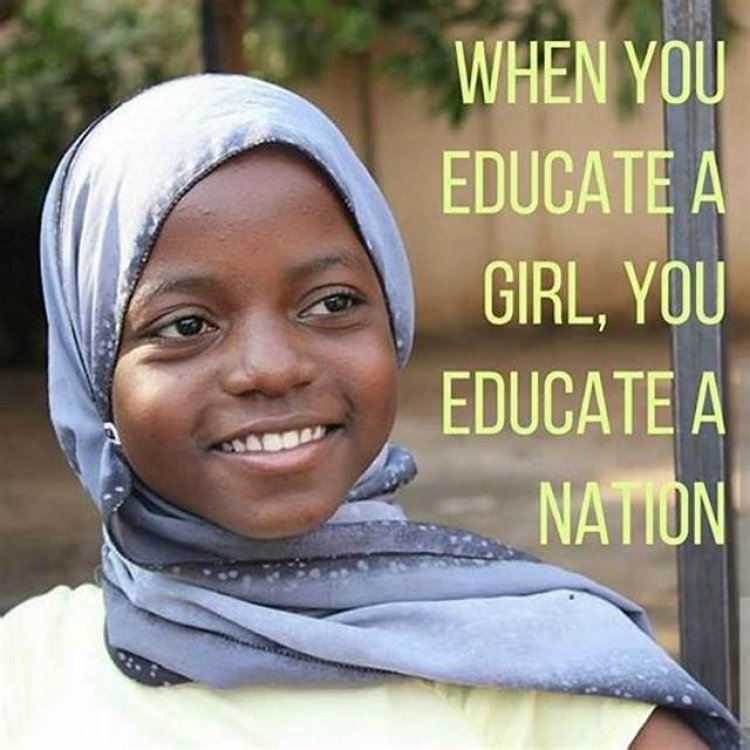Educating the Girl Child: Importance, Challenges, and Strategies for Improvement
Education is universally recognized as a fundamental human right and a cornerstone for societal development. However, in Nigeria, this right remains out of reach for many, particularly for girls

Education is universally recognized as a fundamental human right and a cornerstone for societal development. However, in Nigeria, this right remains out of reach for many, particularly for girls. Despite ongoing efforts by the government, NGOs, and international organizations, the education of the girl child faces substantial challenges.

UNICEF estimates reveal that globally, 122 million girls are out of school. In Nigeria, these challenges are deeply entrenched in cultural norms, socio-economic barriers, and inadequate policy implementation. Despite these hurdles, the importance of educating girls is immense. Educating girls not only empowers them but also benefits society at large, leading to improved family health, economic growth, and reduced poverty rates. UNESCO highlights that an additional year of schooling for a girl can increase her potential income by up to 20%. Yet, Nigeria continues to grapple with one of the highest numbers of out-of-school children, with a significant proportion being girls.
Education plays a crucial role in empowering girls economically. An educated girl is more likely to secure better job opportunities and earn a higher income. According to the World Bank, every extra year of secondary schooling for girls can boost their future earnings by 10 to 20%. This economic empowerment extends beyond the individual, as educated women are more likely to invest in their children's education, thereby breaking the cycle of poverty.
Furthermore, education is pivotal in reducing gender inequality. By providing equal educational opportunities to girls, societies can advance towards gender equality. Educated girls are more likely to challenge traditional gender roles, advocate for their rights, and contribute to a more equitable society. Education also enhances social cohesion and stability, essential for national development.
Health outcomes are significantly improved through education. Educated girls are more likely to marry later, have fewer children, and access better healthcare. A UNICEF study reveals that children born to literate mothers are 50% more likely to survive past the age of five. Educated women also make more informed health decisions, leading to lower maternal and infant mortality rates.
Social and cultural benefits of educating girls include increased social participation and leadership roles. Education fosters critical thinking, confidence, and positive societal contributions. Educated girls are also more likely to raise educated children, promoting a culture of learning and progress.
Cultural and religious beliefs pose significant barriers to girl child education in Nigeria. Traditional gender roles often prioritize domestic responsibilities for girls over education. Early marriage is prevalent, with 42.1% of girls married before age 18, depriving them of educational opportunities and exposing them to risks like early pregnancy and domestic violence.
Poverty exacerbates these challenges, with many families prioritizing boys' education due to financial constraints. The costs of education, including school fees and materials, often force girls to drop out to contribute to household income.
Infrastructure inadequacies also impact girl child education. Many schools, especially in rural areas, lack essential facilities such as clean water and separate toilets for girls. This can discourage attendance, particularly during menstruation. Long distances to schools further pose safety risks, leading to higher dropout rates.
Insecurity, particularly in northern Nigeria, has disrupted education due to the Boko Haram insurgency, which targets schools and opposes Western education. The abduction of schoolgirls, such as the Chibok girls in 2014, has intensified fears, leading many families to keep their daughters out of school.
Addressing these issues requires a multifaceted approach. Changing cultural and religious attitudes through community awareness programs is crucial. Financial support and incentives, such as scholarships and conditional cash transfers, can alleviate economic barriers. Improving school infrastructure, including safe toilets and transportation, is essential. Encouraging more female teachers and mentors can inspire girls to pursue education.
Nigeria has laws supporting girl child education, such as the Universal Basic Education Act and the Child Rights Act. However, effective implementation and enforcement are lacking. Strengthening these efforts and addressing early marriage, child labor, and gender-based violence are necessary steps.
Collaboration among government, NGOs, parents, the private sector, and international bodies is vital for advancing girl child education. Despite progress, significant work remains to ensure every girl in Nigeria has access to quality education. Investing in girls' education not only transforms their lives but also benefits communities and nations as a whole.

 Lois Udoye
Lois Udoye 



